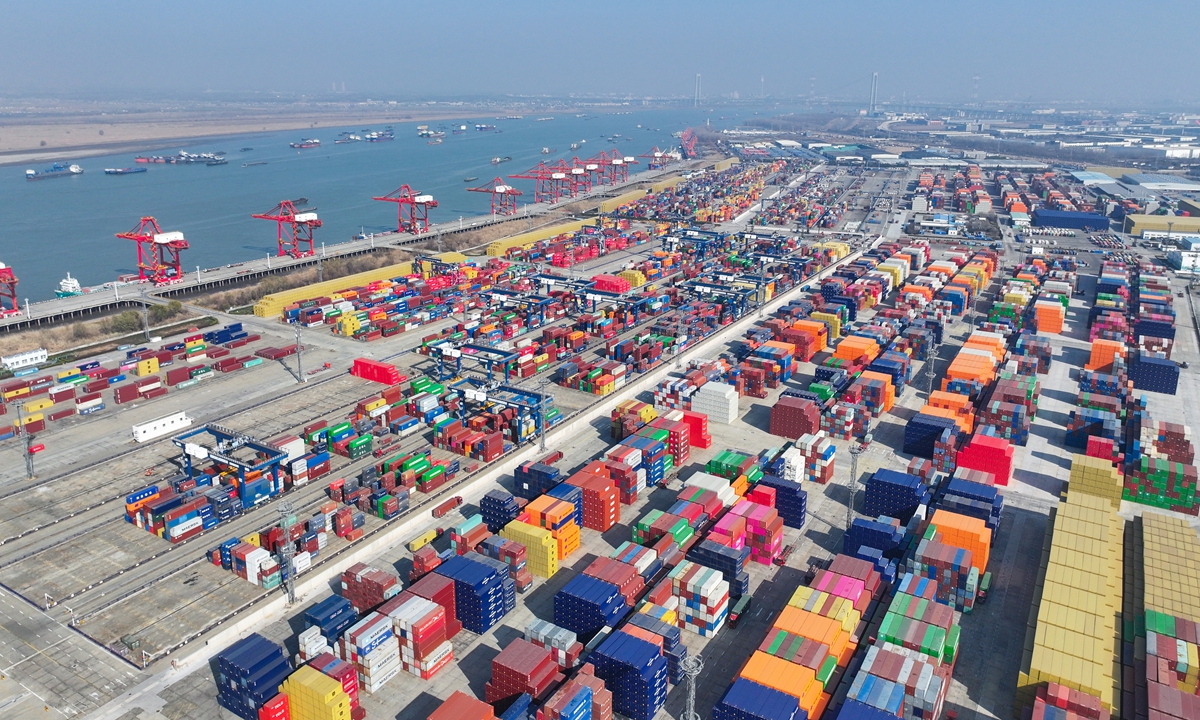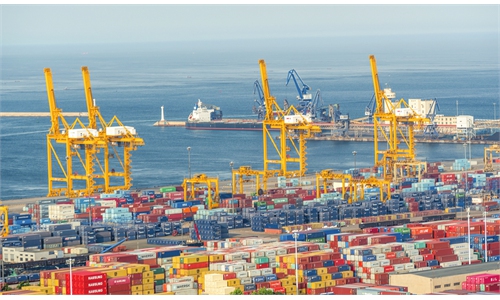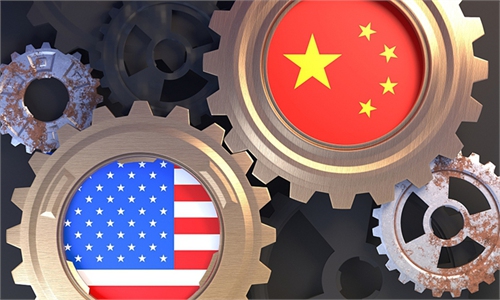Trump's reported plan for reciprocal tariffs on many countries risks disrupting global trade flows, expert warns

Photo shows Longtan Container Terminal of Nanjing Port in Nanjing, East China's Jiangsu Province on January 17, 2025. On the day, data from te National Bureau of Statistics showed that China's gross domestic product (GDP) grew 5 percent year on year in 2024, meeting the government's full-year target. Photo: VCG
US President Donald Trump said on Friday he plans to announce reciprocal tariffs on many countries by early next week, according to a Reuters report on Saturday. The report described the potential move "a major escalation of his push to dismantle and redefine global trade relationships in the US' favor."
Trump did not identify which countries would be hit but suggested it would be a broad effort that could also help solve US budget problems. "I'll be announcing that, next week, reciprocal trade, so that we're treated evenly with other countries," Trump said, noting "We don't want any more, any less," per the Reuters report.
A Chinese professor told the Global Times on Saturday that US' potential escalated tariffs will not only further disrupt specific economies deeply integrated into the global trade system but also risk destabilizing the broader international governance framework, as the universal tariffs are not rooted in market principles but in an "America first" political logic.
Trump made the remarks during a meeting with visiting Japanese Prime Minister Shigeru Ishiba, and Reuters said the move would fulfill Trump's campaign promise to impose tariffs on US imports equal to rates that trading partners impose on US exports.
Previously, the Trump administration announced new tariff policies against Mexico, Canada and China, the US' three biggest trading partners, a move that has already sparked significant concerns and faced strong opposition from various countries and business sectors.
The US government on Monday suspended the 25 percent tariffs on Mexico and Canada for one month, but the 10 percent tariff on imports from China went into effect on Tuesday, and China has filed a lawsuit with the World Trade Organization (WTO) against the tariff hikes.
Cui Hongjian, a professor of the Academy of Regional and Global Governance at Beijing Foreign Studies University, warned that the full-blown tariff policies could disturb the global industrial and supply chains, driving up trade costs and weakening the foundations of world trade flows and global governance.
"Trump aims to address domestic fiscal issues through reciprocal tariffs, but as US trade measures escalate, other affected economies are also formulating response strategies. Such changes could lead to more disruptions in the global trade system and undermine trade negotiation mechanisms, particularly weakening the role of international institutions such as the WTO," said Cui.
Cui added that the escalation of tariff measures will not only affect the interests of countries heavily reliant on foreign trade and international market but also ultimately harm US consumers and industries, as the move is likely to drive up inflation and industry costs.
However, for other countries, it is important to uphold multilateral frameworks that encourage negotiations and cooperation, while taking concrete steps to enhance regional cooperation, which will help stabilize global trade and support economic growth, the professor noted.
China does not take the initiative to provoke trade disputes and is willing to resolve issues through dialogue and consultation, He Yongqian, a spokesperson for China's Ministry of Commerce, said at a press briefing on Thursday, in response to the US' recent tariff action. However, He also stressed that China will definitely take necessary measures to resolutely safeguard its own rights and interests in the face of unilateral bullying acts.
Some nations have been bracing for potential impacts and monitoring developments closely, as the US latest plan could throwing existing trade agreements into turmoil.
Vietnamese Prime Minister Pham Minh Chinh instructed his Cabinet to prepare for a possible global trade war after the US imposed new tariffs towards China. Pham said that "if a global trade war were to occur… it could disrupt supply chains and shrink the country's export markets, posing significant risks to Vietnam's economy," according to the Vietnamese online newspaper Dan Tri.
The Guardian said in a report on Thursday that for Australia, a full-blown trade war would be "bad news" for the country's largest and most valuable commodity export: iron ore. "We probably have more to lose from a trade war than we have to gain," said Chief Executive of the Perth-based Association of Mining and Exploration Companies Warren Pearce, per the report.



